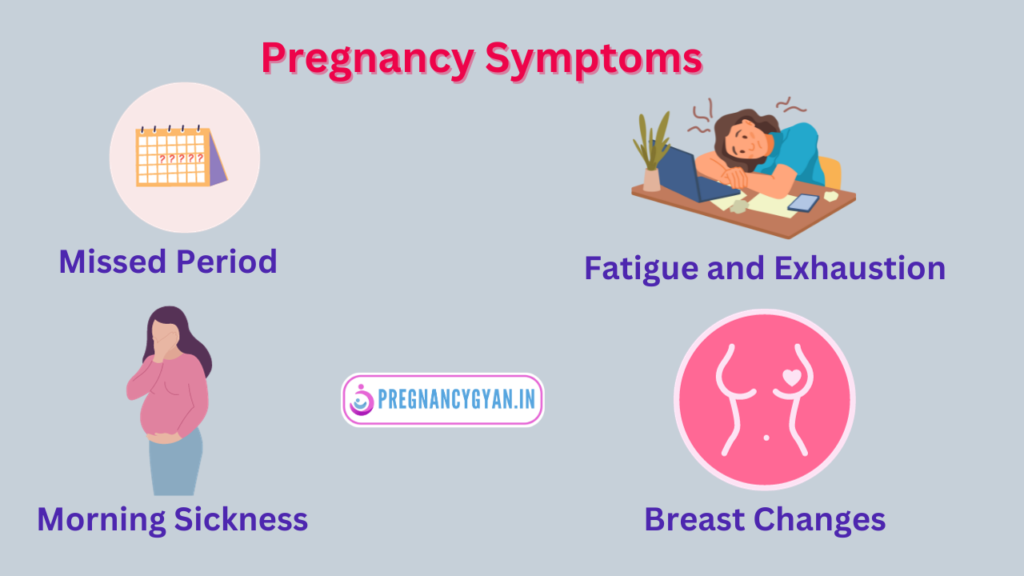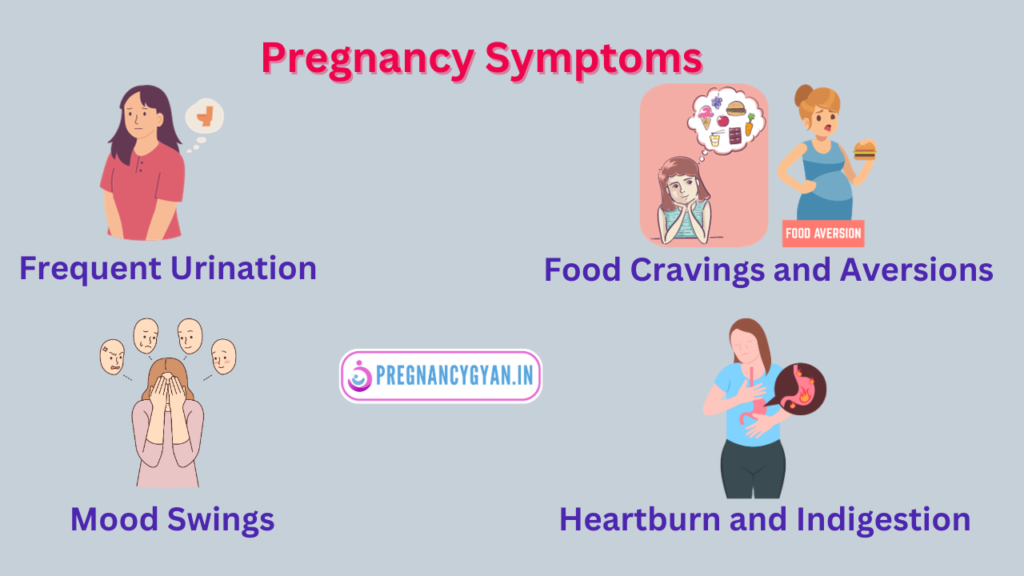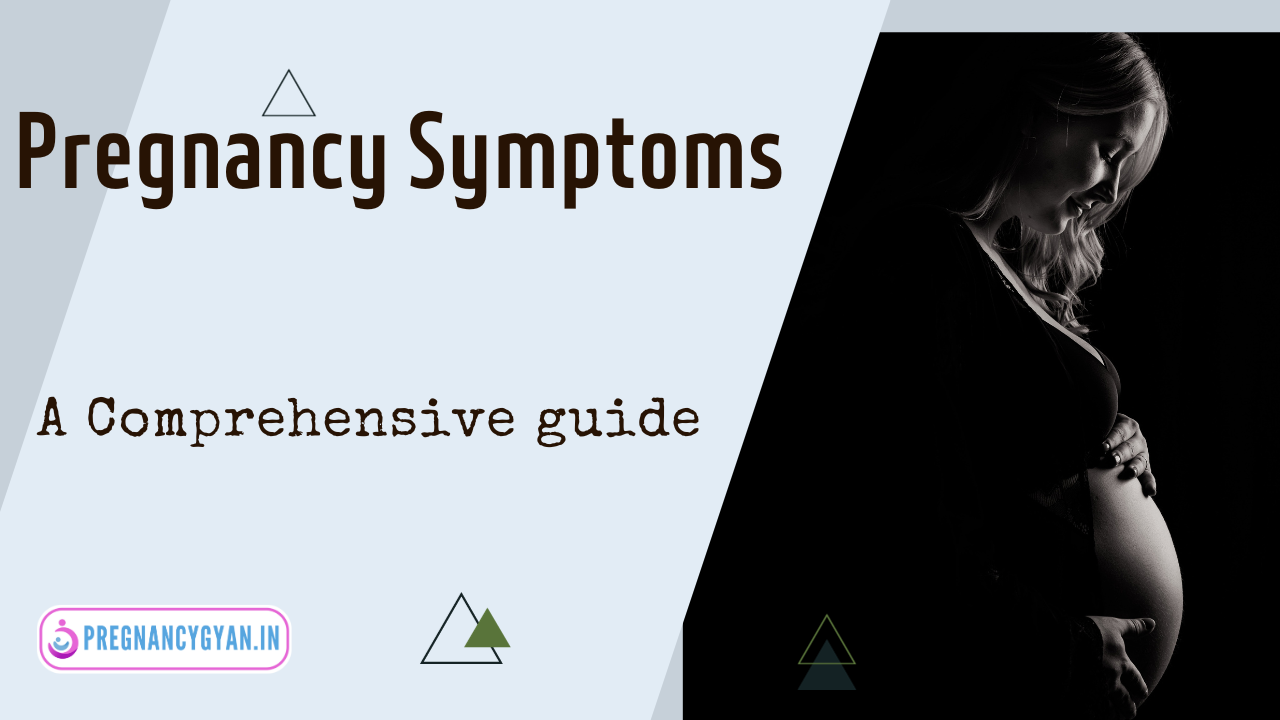इस ब्लॉग को हिन्दी मे पढ़ने के लिए यहाँ क्लिक करे।
Table of Contents
Introduction
A woman’s pregnancy is a transformational and exciting moment in her life. As a woman’s body prepares to nurture new life, it undergoes a series of remarkable changes. These changes are often accompanied by a variety of Pregnancy Symptoms, which can vary from woman to woman and even from pregnancy to pregnancy. In this comprehensive guide, we will learn in detail about the common Pregnancy Symptoms, find out their causes and provide tips to manage them effectively.
Pregnancy Symptoms
1. Missed Period
Of all Pregnancy Symptoms one of the first and most recognizable pregnancy symptom is a missed period. Once conception occurs, the fertilized egg implants itself in the uterus, causing hormonal changes that prevent the shedding of the uterine lining. However, it is important to note that a missed period alone is not a definitive indicator of pregnancy, as it can also be caused by hormonal imbalances or other factors. It is advisable to take a pregnancy test to confirm the presence of pregnancy hormones.
2. Morning Sickness
Nausea and vomiting, commonly referred to as Morning Sickness, affect a large number of pregnant women, typically starting around the sixth week of pregnancy and peaking around the twelfth week.Even though it’s called morning sickness, it can show symptoms at any time of day or night. The exact cause of morning sickness is unknown, but it is believed to be related to the rapid rise in hormones, particularly human chorionic gonadotropin (hCG). Managing morning sickness can involve dietary changes, such as eating small, frequent meals, avoiding triggers, and trying ginger or other natural remedies. In severe cases, hospital admission may be needed.

3. Breast Changes
During pregnancy, the breasts undergo significant changes as they prepare for milk production. Common breast changes include tenderness, enlargement, darkening of the areolas (circular area around nipple), and the appearance of blue veins. These changes are primarily due to hormonal fluctuations, specifically an increase in estrogen and progesterone levels. Wearing a supportive bra and using moisturizers can help alleviate discomfort and keep the skin hydrated.
4. Fatigue and Exhaustion
Pregnancy places considerable demands on a woman’s body, leading to feelings of fatigue and exhaustion. The surge in progesterone levels is primarily responsible for these symptoms, as it has a sedating effect. Additionally, the body is working hard to provide nourishment and oxygen to the growing fetus, which can further contribute to feelings of fatigue. Resting when needed, staying hydrated, and maintaining a balanced diet can help combat pregnancy-related fatigue.
5. Frequent Urination
As the uterus expands to accommodate the growing fetus, it puts pressure on the bladder, leading to increased frequency of urination. The increase in blood volume during pregnancy also means that the kidneys are working harder to filter waste products. This symptom is most pronounced during the first and third trimesters. It is important to drink plenty of water (minimum 2 liters a day) to stay hydrated during pregnancy, despite the inconvenience of frequent trips to the bathroom.
6. Food Cravings and Aversions
Many pregnant women experience unusual food cravings or develop strong aversions or hate to certain foods. While the exact cause of these cravings and aversions is unknown, hormonal fluctuations and changes in taste and smell sensitivity are believed to play a role. It is important to listen to your body’s signals, but also maintain a balanced diet to ensure proper nutrition for both the mother and the developing baby.

7. Mood Swings
A woman’s emotional state can be severely affected by pregnancy hormones, resulting in mood changes and increased emotions. These hormonal fluctuations, combined with the physical and psychological changes that pregnancy brings, can contribute to feelings of irritability, sadness, or anxiety. Engaging in stress-reducing activities, seeking support from loved ones, and practicing self-care techniques, such as meditation or gentle exercise, can help manage mood swings
8. Heartburn and Indigestion
Heartburn and indigestion are common complaints during pregnancy. Hormonal changes relax the muscles of the gastrointestinal tract, leading to slower digestion and increased stomach acid production. The growing uterus also puts pressure on the stomach, increasing the symptoms. Eating smaller, more frequent meals, avoiding spicy or fatty foods, and sitting upright after eating can help alleviate heartburn and indigestion.
Conclusion
Pregnancy is a unique journey for every woman, and the symptoms experienced can vary greatly. While the symptoms discussed in this guide are common, it is important to remember that not all women will experience them in the same way or to the same degree. If you suspect you might be pregnant or are experiencing any unusual symptoms, it is always advisable to consult with a healthcare professional for a proper diagnosis and guidance.
Frequently Asked Questions
How early do pregnancy symptoms start? or After how many days pregnancy symptoms start to show?
One to two weeks after fertilization, symptoms of pregnancy can begin. Common signs include a missed period, breast changes, fatigue, frequent urination, and nausea (often referred to as morning sickness). However, the timing and intensity of these symptoms can vary among individuals. If you suspect you might be pregnant, consider taking a pregnancy test or consulting a healthcare provider for confirmation.
How to confirm pregnancy?
To confirm pregnancy, you can take a home pregnancy test, which detects the presence of the hormone hCG in your urine. These tests are readily available at most Medical Stores and are highly accurate when used correctly. Alternatively, you can visit a healthcare provider for a blood test or ultrasound for confirmation.
How do I know I’m pregnant without a test?
While early pregnancy symptoms can provide indications, they are not definitive proof of pregnancy. Signs like a missed period, breast changes, nausea, fatigue, and frequent urination can suggest pregnancy but can also result from other factors. The most reliable way to confirm pregnancy is through a pregnancy test or a healthcare provider’s evaluation.
How to test pregnancy at home?
You can use a home pregnancy test kit to test for pregnancy at home. Follow these steps:
1. Read the instructions carefully.
2. Collect urine in a clean container.
3. Dip the test strip into the urine or use the provided dropper to apply pour urine drops to the indicated area.
4. Wait for the specified time (usually 1-2 minutes) for the results to appear.
5. Check the test for the presence or absence of lines, symbols, or words as per the kit’s instructions.
A positive result indicates pregnancy. It’s essential to follow the manufacturer’s instructions precisely for accurate results.
What are the symptoms of pregnancy?
Common pregnancy symptoms include missed periods, breast tenderness, fatigue, frequent urination, morning sickness (nausea and vomiting), and mood swings. However, not all women experience these symptoms, and their intensity can vary widely. If you suspect pregnancy, it’s advisable to take a pregnancy test or consult a healthcare provider for confirmation.
Am I pregnant if I miss my period?
A missed period is a common early sign of pregnancy, but it’s not a definitive confirmation. Other factors such as stress, hormonal imbalances, or medical conditions can also cause missed periods. To confirm pregnancy, take a home pregnancy test or consult a healthcare provider for a more accurate assessment.


1 thought on “Pregnancy Symptoms : A Comprehensive Guide”